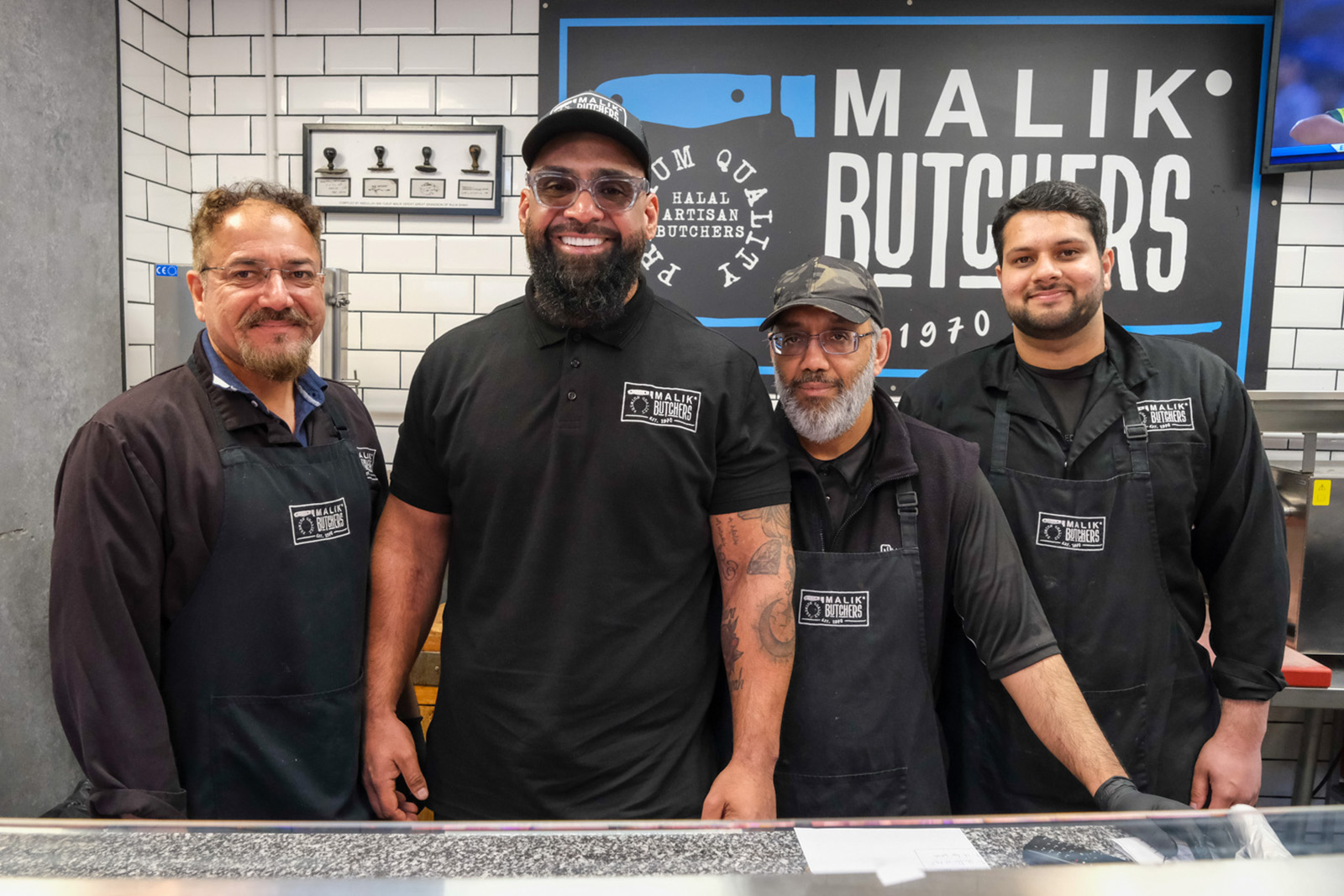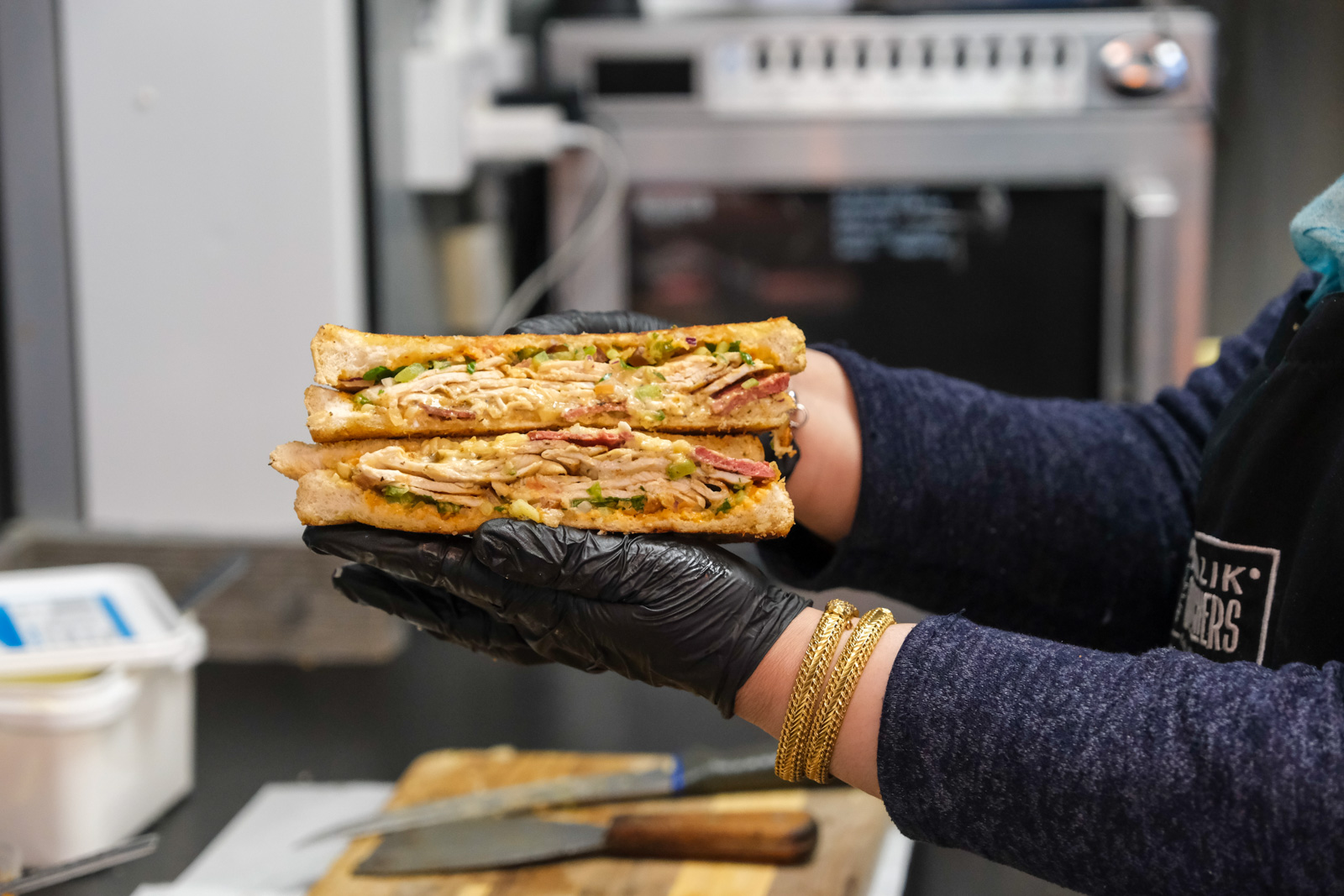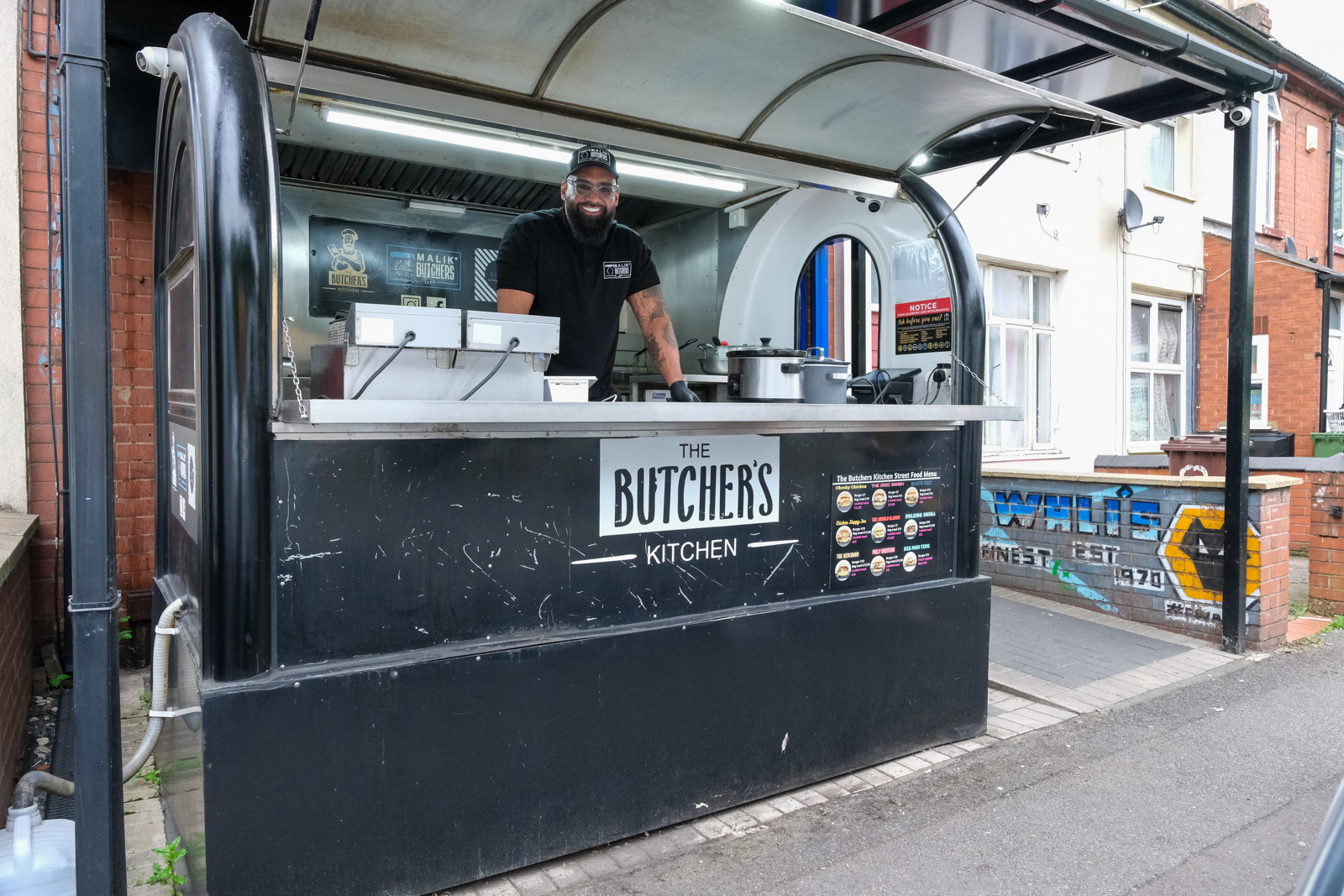The Dubai effect: How halal butchers are thriving in a struggling sector
Foreign fine dining has given Gen Z Brits a taste for adventurous eating, which halal butchers are satisfying with everything from Philly cheesesteaks to wagyu pastrami
–

Malik Butchers is not your average halal butcher. As customers stroll into the Wolverhampton store, they are met with the flavourful aroma of Korean beef wafting from the deli counter, marinated meats on display, and vibrant posters on the wall telling the business’s history. On the day of my visit, the shop is slightly more packed with stock as the team prepare for the Halal Food Festival in Birmingham the following day, while the food trailer outside is being prepped for afternoon sales of smash burgers and Philly cheesesteaks.
Tucked away in a row of terraced houses on a quiet residential street, Malik Butchers opened in 1970 and is thought to be the oldest halal butcher in Wolverhampton. The family-run shop is known for the quality of its meat and non-traditional halal products, such as wagyu steaks and lamb ham. Despite external pressures, such as the Covid-19 pandemic and rising energy bills, it has continued to thrive within an industry plagued by closures in recent years.
Just a short drive away, Bates Butchers, a traditional English high-street shop, closed in November 2022 after more than 90 years in business. It was just one of many butchers that have fallen victim to changing shopping habits and the cost of living crisis.
Data from the Office of National Statistics (ONS) has shown that by 2019, the number of independent butchers in the UK had fallen by 60% in 25 years to approximately 6,000. ONS figures show that from 2008, there has been a steady decline in the number of butchers in the UK, from 6,633 to 5,450 in 2022.
However, things have been different for halal butchers.
“While the number of non-Muslim butchers is declining, the number of halal butchers is increasing,” says Awal Fuseini, senior halal manager at the Agriculture and Horticulture Development Board (AHDB). “The simple reason for this is that if you compare Muslim consumers to the general consumer, they want to go to a halal, independent, small butcher because they have trust in those Muslim-operated butchers.”
While there is currently no data on the number of halal butchers across the UK, the Halal Monitoring Committee has certified more than 800 halal butchers and takeaway shops.
For Malik Butchers, the last few years have seen much growth. In 2018, it launched The Butcher’s Kitchen, a pop-up street-food trailer at the front of the shop. At the start of 2020, the team, led by brothers Manan and Adnaan Malik, spent roughly £150,000 renovating and revamping the business with a fresh, new look reflecting a western-style artisan butcher.
Customers flock from surrounding areas, such as Telford and Walsall, while some come from as far as Manchester, Leeds and even London. The launch of online sales via their website two years ago also broadened the shop’s customer base. To drive these, Manan was set on growing a social media presence for Malik Butchers. The shop’s Instagram page is filled with humorous skits and playful posts promoting their products and has more than 13,000 followers.
“I wanted to create a brand and brand loyalty that isn’t just about the food or meat, but it’s about us as business owners,” says Manan. “It’s about relating to our customer base and audience. The more we do around social media, the more we get people buying from a halal butcher that maybe would have never thought to buy online. We now have a strong base of loyal non-Muslim customers who love our brand and shop with us as opposed to their local butchers.”

Recognising a gap in the halal market, Adnaan, the operations manager, took inspiration from social media, TV and US trends to “innovate and differentiate their business in the marketplace”.
“People really enjoy their in-store experience with us,” says Manan. “It smells of hot food – it’s one of the first things people comment on when they walk in. We also have a superior level of cleanliness and really good customer service, for example, we give people samples of our cooked meats if we know it’s their first time visiting.”
During the renovation, they also launched their Deli 64 counter, where customers can buy the likes of toasties and rice boxes using Malik’s own cured meats. The team also introduced new value-added products not typically found in halal butchers, from premium beef steaks to Chilean wagyu, wagyu pastrami, beef bacon and handcrafted chicken sausages.
“These are not things you get in traditional halal butchers or even products that you get at premium English butchers,” says Manan. “We’ve taken inspiration from artisan butchers, but we’ve taken it a step further. We’ve got these scarce products that are very much in demand and made them accessible. Our innovation is what has brought people through the doors.”
Understanding their demographic has also been key to Malik Butchers’ success in recent years. Gone are the days of catering solely to the “aunties and uncles” of the local community, but instead honing in on the desires of the younger generation of British Muslims. “They are a lot less price sensitive and have more disposable income,” Manan says.
Adnaan refers to it as the “Dubai effect”, with younger people becoming influenced by foods and restaurants they have enjoyed while on holiday. “They come back and want access to that experience regularly, and they’re willing to spend a bit more than their parents would have done,” says Adnaan.

For Tashmeen Haque, 29, holidaying in the Middle East has certainly influenced her and her husband’s shopping habits at their local halal butcher in Woolwich, southeast London. During a recent holiday in Doha, Qatar, Haque enjoyed easy access to a range of halal foods and restaurants. Back home, she has a choice of a few halal butchers on her local high street, but the range of international foods, cleanliness, lack of “foul smells” and supermarket-like feel drew her to a nearby Turkish butcher.
“When I do my meat shops with friends, we’re seeing how we can recreate foods we’ve eaten at restaurants, so we’re looking at the different cuts of meats we can buy,” says Haque. “We’re also now able to buy the kinds of foods I watched my friends eating while growing up. We eat the likes of pastrami, pepperoni, and salami a lot in our household now – it’s still a novelty for us.”
As for older generations, they have seen the halal meat industry grow immensely over the years. When Saada Saidu-Bala, 60, first moved to the UK as a student in the 80s, there were very few halal butchers in her university town of Hatfield, so she would often buy kosher meat instead. On other occasions, she would join Muslim students in paying one of their car-owning classmates to drive to nearby Luton and buy meat for all of them.
“I’ve gone from not having any halal butchers in the city I was living in, to now having three on my local high street,” says Saidu-Bala. “That’s how close they’ve become. If I didn’t have those options, then I could even go to my local supermarket, but my first choice is always going to be my local butcher. They’ve become much more innovative – they’re filling the gap in what’s missing in our community.”
Keeping up with innovation and trends is something that sector experts also believe is key to thriving in the butcher business.
“Halal butchers have to change their game,” says Fuseini. “The consumption behaviour of Muslims is changing, and if they don’t change their ways, younger consumers will move away from the independent Muslim butchers and look elsewhere. Young people who have money want to be able to go to a butcher and buy a loin steak or something else modern. But our local butchers often don’t have the skills to do those small cuts.”
While appealing to a younger audience has grown Malik’s business in recent years, for Al-Amin, a Muslim-owned grocery shop in Cambridge, having customers of all ages and backgrounds has been essential to its continued success. Situated on Cambridge’s multicultural Mill Road, Al-Amin has been a source of international groceries for almost 30 years. It also provides the city’s Muslim community with halal meat.
Over the years, both the Muslim and wider Cambridge community have continued to support the business, recognising Al-Amin as a trusted brand, says owner Abdul Kayum Arain.
“I’ve always been vested in the community. I think that’s made a difference in how we do business. We’re not just seen as a shop, but a community hub,” says Arain.
During the cost of living crisis, the business has felt the effects of rising energy bills, with the cost of electricity nearly tripling from £1,700 a month to roughly £5,000. The opening of mainstream supermarkets nearby has also reduced its revenue.
“When the Sainsbury’s Local opened, it sucked the local blood out,” says Arain. “The people who benefit from the money are not from the local area, so the local community is losing out. We may just be losing around £300 to £400 a week in general sales, but it adds up over the year and could have been money put towards staff’s wages.”
But unlike traditional English butcher shops, Arain believes that halal ones can absorb some of the business’s costs. As most halal butchers are family-run, they may not always pay themselves the average wage. For example, when Arain first started his business, he paid himself £50 a week for two years to give Al-Amin the required cash flow.
“Traditional butchers tend to have well-trained staff who demand a proper wage, averaging on £32,000 a year,” says Arain. “If you’ve got three butchers on staff, their salary plus other contributions like pension all add up and will eat into your cash flow. Sooner or later, the business is no longer sustainable.”
Like Malik Butchers, Al-Amin has also entered the world of online sales, adjusting to the shift in consumer behaviour. During the pandemic, Arain introduced an online shop where customers could buy their groceries and meat. Those sales now make up about 30% of the business’s profits, a figure Arain expects to rise.
Despite the challenges independent food retailers continue to face, the Malik brothers and Arain are bullish about the future of their businesses.
“I’m excited for the journey of Malik Butchers,” says Manan. “I want to dedicate more time to the business. We’re now the third generation operating the butchers and we’re taking it to new heights. We just want Malik Butchers to be a well-known brand, in the UK and internationally, and among Muslims and non-Muslims alike.”
Topics
Get the Hyphen weekly
Subscribe to Hyphen’s weekly round-up for insightful reportage, commentary and the latest arts and lifestyle coverage, from across the UK and Europe
This form may not be visible due to adblockers, or JavaScript not being enabled.